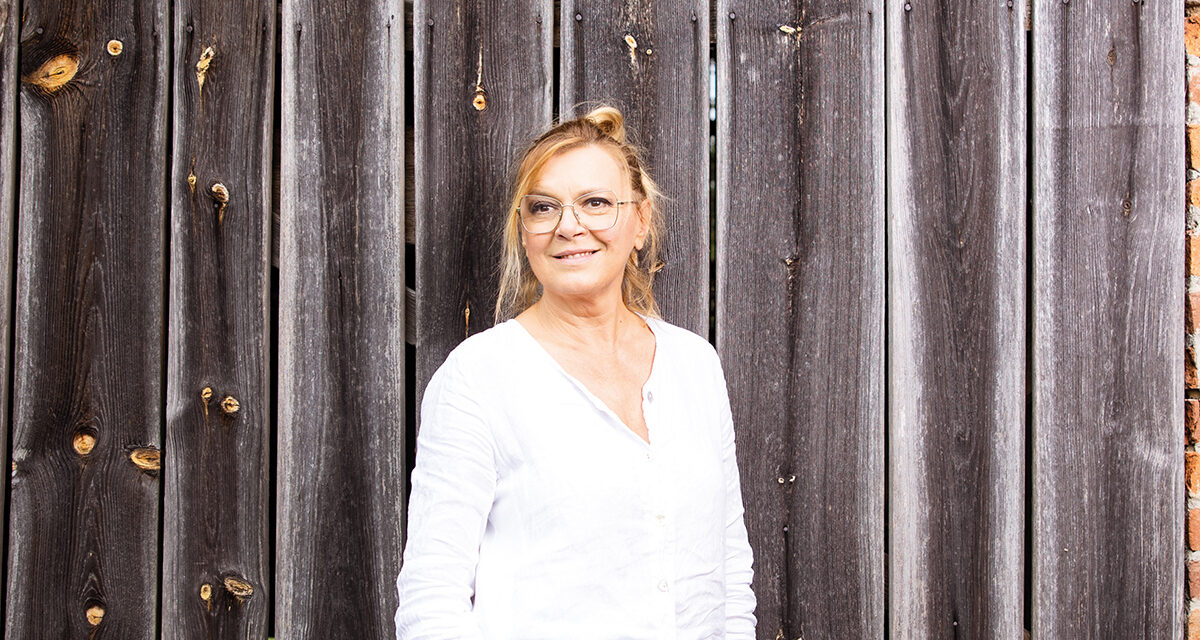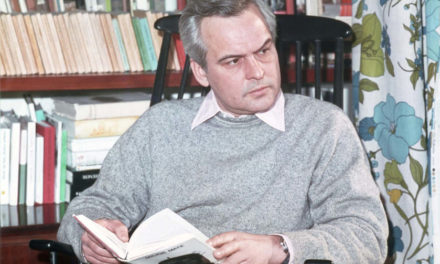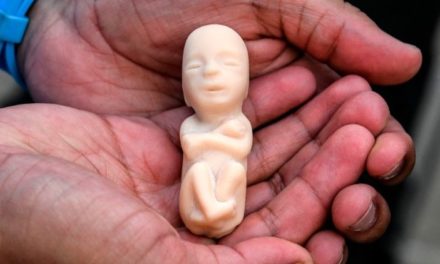You can make good cuisine if you have good producers, says the presenter. An interview about family traditions, the state of Hungarian gastronomy and our changed world.
He's known the Guard for nearly twenty years, so maybe he already knows the answer: what's the secret of the people who live here?
Szent István settled them here. The great predecessors were Székely border guards, and today's are also tough, upright people who stick to traditions. We bought the plot that year as Uncle Vili had already promised it to a Dutch couple, but when he found out that we didn't want to demolish the building, which his great-grandfather had built, but to restore it, he gave it to us for less money. We are twenty years into what the area looks like today.
What does this property mean to you?
Everything. My husband and I found each other right then, this is our joint love project.
As a small child, I was also there in the corn field, we picked it from five in the morning until dark.
He was a child in Madaras, a small village on the Serbian border. I guess I'm not wrong that he fell in love with the land there.
I grew into it. We grew everything from herbs to sweet corn and peppers to tomatoes. It could be forty degrees or even raining, we had to go. As a small child, I was also there in the corn field, we picked it from five in the morning until dark. The other children went to the Sugovica to bathe, and I spent the whole day picking corn with my parents and brother. It was natural. Of course, it happened that I told my father that when I grow up, I definitely won't have sweet corn, and that I don't even need a palm's worth of land.
What did your father answer?
Here's her face in front of me: she just winked and kindly said, she's fine, my little girl, we'll see...
He died early; what if he saw, after all, the garden and the land became his life?
He would be proud of me. He was a very wise man. My brother, who is seven years older, and I were brought up in such a way that we were not limited in anything, and everything was told and shown. Of course, there were invisible frameworks and tasks. As I said, we also had to work and help on the ground, but there they also paid attention to our success. I remember when we picked corn all day long, everyone had a line; now I know, my parents quietly helped me join my ranks to make me feel that I am equal. My mom worked three shifts. If it was a day room, at the age of ten I had to clean it, wash the bed linen, and starch it. There was no question, I knew it was my job. I loved doing the laundry, then putting the clothes on and spreading them out in the attic.
You can make a good kitchen if you have good producers.
Do you think about your father often?
Every day, it's here with me. I would be happy to show him my garden, although I am actually showing him now. For example, I grow melons because he was a fantastic melon grower. It's strange here in Őrség, the locals used to say: well, here is this peasant girl who grows melons even in Őrség. Of course, it's not easy, you need a bed and a greenhouse and a lot of care, but it grows wonderfully.
Just the other day, I read that Mór Jókai and Vilmos Zsolnay also grew melons.
Because it is a higher level within garden culture. Like my father, I do not use any chemicals, I could even say that I practice organic farming, but since it is nothing more than a family tradition, our parents and grandparents did not use anything either, but the harvest was excellent.
Does the fact that he never gives up come from his childhood?
Likely. I had my way, but I found myself in television. It gives me a good feeling that only at the very beginning of my career there was a show that was about entertainment for its own sake, after that I can safely say that all my shows provided the viewer with some kind of added value.
On screen, he behaves naturally, without any mannerisms, and his curiosity seems genuine. A great treasure…
I have been curious about the world since I was a child, I am interested in people.
He stated somewhere that he was trying to talk to as many grandmothers and great-grandmothers as possible, because they still knew the secret of farming.
I often think of my grandmother Borbás. He left early, I followed his every move until I was ten years old. He knew everything about food and plants. When we ate something, he added green spices that would support our burdened stomachs. He knew which vegetables should be picked at what time to give the best quality. I also heard from him that the shelled pea halves its valuable content every hour after picking, so it must be shelled and stewed immediately, because then it remains fresh and delicious. She was a thin aunt in a shawl and a big skirt, in a mud house with a straw roof. He washed with rainwater and cooled things in the boom well. I remember how he kneaded the dough. He rolled it out quickly and incredibly thin, while the flour just floated in the air. I don't remember anything. How have you ever eaten…
Grandmothers are leaving and the world is changing. Also on Madaras?
I will give you an example of change. There was no vegetable shop in Madaras for a long time, they didn't even know what it was. Everyone produced what they needed. As a child, even I went next door for flat peaches, because we didn't have any, or two corners for salad, because they grew primroses there. Then came the system change, and a few years later, the first vegetable shop opened in Madaras. In addition, its owner brought the bulk goods from the wholesale market. It was an overwhelming experience. And I was asked on the street why I let my parents work in the garden and on the land, why I don't buy them vegetables and fruit, it would certainly be enough. These people didn't understand the point, and maybe they still don't. Their fathers had a garden because they wanted to eat delicious, high-quality and healthy food. My mother is still working in her garden at the age of eighty-two, with help, of course. It would die if you let the area become wild and overgrown with weeds. Today we have come to the point that, unfortunately, there are also few home gardens in Madaras, because the old people, for whom it was still important, have left...
What does your mother say about the guard estate?
Although it is difficult for him to move out, if he is with me for a week or so, he is very proud of me. He also tells everyone how fantastic his daughter grows beans and melons.
It is possible to give low-quality food cheaply, good quality at a high price, but to give poor quality food at a high price is villainy.
Gasztroangyal debuted in 2011 and became a huge success, and today we are at the point where hundreds of thousands of people follow Marci Borbás on the internet. Can you keep up the pace?
I'm tired from time to time, but basically I can handle it because I love it. We no longer film Gastroangel, I admit, the constant traveling week after week has worn me out, I'm tired. For a long time I said that I wanted to do nothing but make jam in the Guard.
He came in after all.
Yes, but now I know that our desires must be formulated precisely. Because I don't work an iota less, in fact.
Could you just cook jam for the rest of the day?
No. Neither materially nor morally, because my colleagues are family members to me, wonderful people. I can't stop because of them either, and mostly because I still have a passion for the garden and gastronomy. My husband and I spent a few days in Italy in May. We had to stop at every small kitchen garden and go to every farm store for seeds. Fortunately, he handled it well. I am constantly experimenting with what kind of plants will remain in the Guardhouse. This year, for example, I got a large basket of artichokes, the plant was as big as me. According to them, it can withstand the climate.
Are you trying to native plants because of climate change? For example, one of my figs has grown taller than the house, it is getting better and better, and sometimes I can even hear cicadas at the end of the garden. Don't you think the situation is worrying?
Down in the south, in Madaras, figs produced four times a year at that time. Climate change bothers me too, but I'll try to respond to it if I can't do anything but tell you that it's not a good direction. Recently, for example, I have been experimenting not only with Mediterranean but also with Peruvian plants. I'm constantly looking for new opportunities, I used to say that if someone has a hammer, they see everything as a nail, well, I'm like that with plants and the garden, that's what I'm always thinking about.
The time has come when people think twice about what they spend their money on.
Is the series "Kertem" a big success on Egy.hu?
People love it, and I hope that as a result, more and more people will start gardening. All you need is a small piece of land or a balcony, and it gives you fantastic experiences, not to mention the fact that you can cook with high-quality ingredients. If a person produces for himself, he also learns not to waste, to use everything for something. Of course, there were mean comments in the beginning, for example: don't believe that he does the garden, he just stands there talking about it. Well, I do it, and not only on the day of the shooting, but always.
How many meals have you been there to cook during your TV career?
Many thousands.
And do you still like to cook after that?
I like to cook and eat, but I eat differently than, say, twenty years ago. People experience and develop. For example, we only eat meat occasionally. Just like our grandparents, who only had meat on the table on Sundays.
What kind of food is on the table?
What I produce in the garden. I go out in the morning and get lost in it for hours. Then I make a delicious smoothie from the fruits and vegetables and add peeled hemp seeds. Very healthy. Then I remember that it is one o'clock in the afternoon, but there is no lunch yet. There is no lunch, but there are squash, eggplant, sugar snap peas, Swiss chard and many other delicacies in the garden. I prepare a hot meal for lunch, mainly vegetables. For example, we love Far Eastern pho soup. We also eat fish from time to time, and usually salad in the evening. Fortunately, my husband also likes this kitchen.
How do you see the state of Hungarian gastronomy?
The coronavirus epidemic has brought a difficult situation, as many restaurants have closed. I feel sorry for them, but I am convinced that the situation brought a kind of purification. I think the same way about the current financial problems. The time has come when people think twice about what they spend their money on. From then on, it will be less likely that they will leave a lot of money in a restaurant for bad food. Because it is possible to give low-quality food cheaply, good quality at a high price, but poor quality at a high price, that is villainy. I definitely expect progress in this area.
Is the domestic wine culture or gastronomy in a better position?
The wine culture began to develop earlier, but there can be no complaints about the gastronomy either. We have great, qualified chefs, we still need good owners - respect for the exception - who focus on quality and are satisfied with a small profit. So the intellectual knowledge is there, but the market is not balanced, good raw materials are still missing in many places. I am convinced that you can make a good kitchen if you have good producers, or more precisely, there are many of them. Because even today you can still find excellent lamb meat, there is good trout, or I can mention the Balaton fish that thrive in the waters of Lake Balaton and only eat mussels raised in the lake. But these are only refreshing exceptions today.
To what extent is snobbery present in the domestic gastroculture?
A lot, but it is also necessary.
Could you explain that?
Snobs are usually the first to discover new, sophisticated places. They shop first, they have lunch there, they reserve the seats. Then, if the restaurants and bakeries remain, crowds will come to them. In this case, snobbery does not have a negative meaning for me.
Do many people follow you?
Our videos and articles reach almost a million people on social media. That's a lot, and this achievement comes with a lot of responsibility.
Can we say that Marcsi Borbás is in love with his plants?
Fully.
Do you also believe that plants have souls?
There is a lot of evidence that they respond to their environment. Already in the sixties, they established that they communicate with each other. If a pest, such as a mite, comes to a plant, it notifies the one next to it, which also starts to defend itself against it. And the most thought-provoking experiment was when a person broke off a branch of a tree, and they saw what happened if he approached the tree again later. The data were measured using electric waves. Many, many people walked by the tree and nothing happened, then again the breaker appeared next to the tree, and the electric waves indicated the vibrations of the tree. According to them, they also have memory.
For a long time I said that I wanted to do nothing but make jam in the Guard.
Of the countless Gastroangel episodes, who do you often think of?
Many people, but perhaps the one I mention the most is Aunt Irénke. He said that a good woman saves time, money, and raw materials. It is still a relevant idea today.
When does something new appear on the TV screen?
I do not know. I've never had a single show planned in advance, it just kind of came and we did it. Maybe I'm lucky, because I always started a show at a good time. The wine magazine Vörös és behér started at the dawn of wine culture, at the best time. At Gastroangel, just when artisanal foods started to spread, we just had to introduce them. I can also mention the show Kertem, which came out half a year before the epidemic. Who knew then that due to the confinement, my own garden would remain the only living space? You can see from this that I am a lucky person, my angels work very well up there...
Featured image: Árpád Földházi












